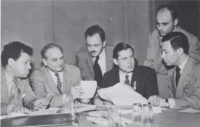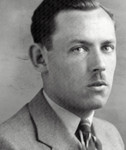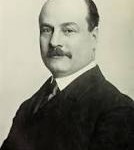Composer and conductor Leonard Bernstein (1918-1990) was a supporter of the Bergson Group.
During the war years, Bernstein anxiously following the news about the slaughter of European Jewry. His symphony “Jeremiah,” which premiered in January 1944, included a movement called “Lamentation” that was meant to allude to the Nazi massacres. “How can I be blind to the problems of my own people?,” Bernstein remarked to reporters at the time. “I’d give everything I have to be able to strike a death blow at fascism.” That spring, he was a signatory on a newspaper advertisement by Bergson’s American League for a Free Palestine, which described Europe’s Jews as “persecuted by enemies and ignored by friends” and called for “the immediate opening of Palestine.”
As the struggle to establish a Jewish state intensified in the postwar years, Bernstein became more actively involved. In 1947, he conducted concerts for the Palestine Philharmonic Orchestra, despite the warfare raging between the British Mandate authorities and three Jewish underground militias: the Haganah, the Irgun Zvai Leumi and the Stern Group. Bernstein sympathized with both the Irgun and the Haganah; he had publicly endorsed the pro-Irgun Bergson group and also served on the national council of Americans for Haganah. A benefit concert that he gave in New York City in 1948 to benefit the Irgun was picketed by members of Americans for Haganah. The event included pro-Irgun speeches by actors Luther Adler and Ruth Chatterton, Bergson Group official Alex Wilf, and an Irgun fighter who identified himself only as “Jacoby.”
Bernstein apparently never regretted his backing for Bergson or the Irgun. One Bergson Group leader, Alex Rafaeli, said in a later interview that as late as the 1960s, Bernstein continued to give him and other Bergson activists free passes to his concerts when they visited New York. “Bernstein acted from the heart, not from the head,” Rafaeli said. “When he cared about an issue, whether it was the Holocaust or Israel or some other issue that moved him, he felt it deeply and he wanted to do something about it. You can’t say that about most people.”
Sources: Baumel, The “Bergson Boys,” p.114;
Medoff , Militant Zionism, pp.150, 196.











